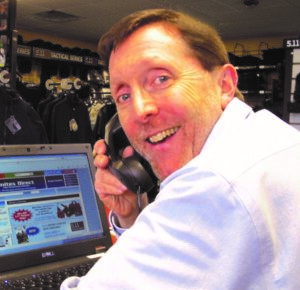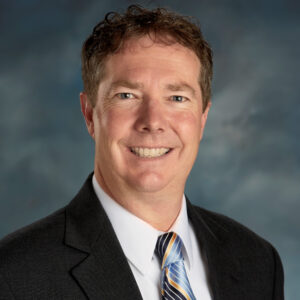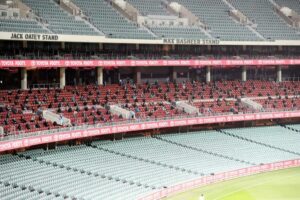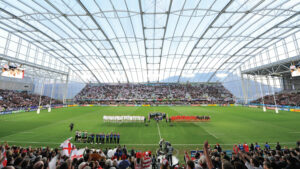Nation Shall Not Lift Up Sword Against Nation, Neither Shall They Learn War Anymore
(Editor’s Note: The following submission by Dan Mendelson is written to Frantzer LeBlanc, whose article appeared last week on Front Row News and the IAVM newsletter.)
By Dan Mendelson
Frantzer,
Thank you for sharing your stories. They are heart wrenching. We’ve met, talked and done business together. For that I am thankful for our time together in Daytona Beach, Florida, at an IAVM event.
I live in West Bloomfield, Michigan. It’s an upper middle class neighborhood. I have African American neighbors on my street and throughout my neighborhood.
Since coronavirus came upon us I have been running outdoors. When George Floyd was murdered, I stopped in my  tracks when I saw a young African American woman out running on the opposite of the street and said, “I am sorry for what is happening to your people.” She acknowledged it and turned to continue running. I stopped again and said, “Please tell everyone in your community that I am sorry for what is happening to you.” She smiled and turned to go. She said, “I will.” Two days later another older woman was out walking her dog. I shared my sentiments with her. She said, “All you need to do is say good morning.” I did and I will. It is where we can start.
tracks when I saw a young African American woman out running on the opposite of the street and said, “I am sorry for what is happening to your people.” She acknowledged it and turned to continue running. I stopped again and said, “Please tell everyone in your community that I am sorry for what is happening to you.” She smiled and turned to go. She said, “I will.” Two days later another older woman was out walking her dog. I shared my sentiments with her. She said, “All you need to do is say good morning.” I did and I will. It is where we can start.
I hope by at least acknowledging it, I can make my neighbors who don’t have the same skin color as me understand that I grieve for them when hatred is evinced in our community of America.
Frantzer, we share some common friends. I miss them dearly as I am sure you do as well.
I miss our friends John, Martin, Bobby, and Abraham who were murdered.
Last year I visited the Boston museum built in John’s memory. Here is what I learned. John was a history buff. He would have been a professor but his older brother died in WWII and he was thrust into a new role. If you ever listened to John’s speeches and press conferences you would know that he was intelligent. As our chief executive he made some mistakes. I also visited the museum in Dallas and grieved on that day when I saw how his life was taken from us. I was eight-years-old when John died. I’d been to my Cub Scout meeting that week. My sister had her bat-mitzvah that Friday evening in our synagogue. The Rabbi was quite somber. America changed then.
John Kennedy would have had a great second term and perhaps he would have exited Vietnam when he realized the error of his ways. Our loss of John changed history. That war affected us all and certainly black Americans who were one-third of the foot soldiers in Vietnam. Money spent on the war robbed us of the resources for important social programs when we needed them.
I made a pilgrimage to Martin’s home in Atlanta where he grew up, a National Historic Site. A park ranger led a tour. He talked about Martin’s short time on earth. His home was down the street from the church where his father was a pastor and where Martin learned the cadence of his profession.
Frantzer, have you been there? It is worth taking your family to see how our government has preserved that memory, his church, and created a memorial park. It is beautiful and peaceful. The museum about Martin Luther King, Jr. helped me more to understand the struggle for civil rights and what he went through by being that leader when we needed him.
About Bobby, what can we say? He was in Indianapolis campaigning for the chief executive role of our country in April 1968 when he was informed about Martin’s assassination. He stood up on the back end of a truck and spoke to his feelings. The crowd of majority blacks and whites listened. He implored them not to be bitter. It has been said that this was probably the greatest speech of Bobby’s campaign because it was delivered extemporaneously.
Here is what Bobby Kennedy said: (You can also find this speech on You Tube; it is wrenching to watch.)
“I have bad news for you, for all of our fellow citizens, and people who love peace all over the world, and that is that Martin Luther King was shot and killed tonight.
Martin Luther King dedicated his life to love and to seek justice for his fellow human beings, and he died because of that effort.
In this difficult day, in this difficult time for the United States, it is perhaps well to ask what kind of a nation we are and what direction we want to move in. For those of you who are black–considering the evidence there evidently is that there were white people who were responsible–you can be filled with bitterness, with hatred, and a desire for revenge. We can move in that direction as a country, in great polarization–black people amongst black, white people amongst white, filled with hatred toward one another.
Or we can make an effort, as Martin Luther King Jr. did, to understand and to comprehend, and to replace that violence, that stain of bloodshed that has spread across our land, with an effort to understand with compassion and love.
For those of you who are black and are tempted to be filled with hatred and distrust at the injustice of such an act, against all white people, I can only say that I feel in my own heart the same kind of feeling. I had a member of my family killed, but he was killed by a white man. But we have to make an effort in the United States, we have to make an effort to understand, to go beyond these rather difficult times.
My favorite poet was Aeschylus. He wrote: ‘In our sleep, pain which cannot forget falls drop by drop upon the heart until, in our own despair, against our will, comes wisdom through the awful grace of God.’
What we need in the United States is not division; what we need in the United States is not hatred; what we need in the United States is not violence or lawlessness; but love and wisdom, and compassion toward one another, and a feeling of justice toward those who still suffer within our country, whether they be white or they be black.
So I shall ask you tonight to return home, to say a prayer for the family of Martin Luther King, that’s true, but more importantly to say a prayer for our own country, which all of us love–a prayer for understanding and that compassion of which I spoke.
We can do well in this country. We will have difficult times. We’ve had difficult times in the past. We will have difficult times in the future. It is not the end of violence. It is not the end of lawlessness. It is not the end of disorder.
But the vast majority of white people and the vast majority of black people in this country want to live together, want to improve the quality of our life, and want justice for all human beings who abide in our land.
Let us dedicate ourselves to what the Greeks wrote so many years ago: to tame the savageness of man and make gentle the life of this world.
Let us dedicate ourselves to that, and say a prayer for our country and for our people.”
In June 1968, Bobby was assassinated the week before my bar mitzva. Of course, the speech that I’d written to give at synagogue had been polished weeks before Bobby’s death. In it, I quoted the Biblical prophet Isaiah, who spoke about God with these words. “He shall judge between the nations, and shall arbitrate for many peoples; they shall beat their swords into plowshares, and their spears into pruning hooks; nation shall not lift up sword against nation, neither shall they learn war any more.”
It’s been more than 50 years since Bobby spoke about Martin and more than 50 years since Martin spoke to all of us about non-violence. Isaiah encouraged it more than 2,000 years ago and is the lesson that I learned from my teachers and carried it forward to my children. I hope it is the lesson that I think we’ve all finally learned in the death of George Floyd – that non-violence and co-existence is the new lesson for the day, the rest of our lives and for all time for everyone on this infinitesimally small blue marble situated in the vast heavens of the universe.
Frantzer, you are a role model for your family, your community, and your industry and I am thankful that our paths have crossed and look forward when in safety and in health we can see each other again and we can talk about Martin, Bobby, John, and Abraham – who started us on the process of reconciliation so long ago.
My entire life, I have been and will continue to be politically active in important social causes – now is the time for more action. I am here to join you and to fight for justice in this country. Let’s get started.
Dan Mendelson is President of Unitex Direct, Inc., based in Walled Lake, Michigan.
Venue Coalition Names Todd Hunt, CVE, as New Senior Vice President
By Molly Rosenberg
Venue Coalition recently announced that Todd Hunt, CVE, will be joining the company as Senior Vice President, Client Services & Partnerships. In his new role, Hunt will focus on national booking and business development while continuing to service new and existing Venue Coalition clients.
An active member in the International Association of Venue Managers (IAVM), Hunt is currently serving as past  chair of the Board of Regents at Venue Management School. In addition, he has served on the IAVM Board of Directors and chaired numerous committees and councils for the organization. Since 2007, Hunt has been the Executive Director of the BancorpSouth Arena and Conference Center in Tupelo, MS. In that role he actively booked the venue, bringing major headline entertainment including Elton John, James Taylor, Chris Stapleton, Cirque du Soleil, and many more to the region.
chair of the Board of Regents at Venue Management School. In addition, he has served on the IAVM Board of Directors and chaired numerous committees and councils for the organization. Since 2007, Hunt has been the Executive Director of the BancorpSouth Arena and Conference Center in Tupelo, MS. In that role he actively booked the venue, bringing major headline entertainment including Elton John, James Taylor, Chris Stapleton, Cirque du Soleil, and many more to the region.
“My 30-plus years of experience as a talent buyer and venue operator coupled with my 13 years of experience as a Venue Coalition member have provided me with an appreciation for the services this organization provides to the industry,” Hunt said. “I am excited to join the VC team and for this next chapter in my career.”
“We’re thrilled to add Todd to our team,” said Andrew Prince, Venue Coalition President. “His reputation throughout the industry is impeccable, and the knowledge he brings to the table will allow us to take Venue Coalition to new heights. We know our members will benefit from this new addition.”
Molly Rosenberg is Director of Administration / Human Resources for Venue Coalition, Inc.
TRG Arts Study Reveals U.S. Performing Arts Organizations’ Creative Plans for Autumn Return
By TRG Arts
Results of a study released by international arts management consultants TRG Arts reveal that of its clients surveyed across three countries, U.S. performing arts organizations have the most optimistic outlook. The new study, “Arts and Culture 2020 Comeback,” finds 63 percent of U.S. venues are planning an autumn return, compared to 54 percent of clients overall surveyed in the U.S., Canada and the United Kingdom who are planning to return to performances by the end of 2020 after shutdowns caused by the COVID-19 global pandemic.
Delivery method and specifics for returning to performance are highly variable, and will rely on national and  local guidance, the study shows. A mix of socially distanced live performance, open-air live performances, live streamed performances, and recorded delivery options are being contemplated by clients.
local guidance, the study shows. A mix of socially distanced live performance, open-air live performances, live streamed performances, and recorded delivery options are being contemplated by clients.
Among the genres, dance and multi-disciplinary organizations are the most optimistic with dance’s optimism likely fueled by the requirement for Nutcracker revenues to bring stability to the balance of the 2020-21 season. TRG U.S. client expectations for returning in 2020 by genre are:
• Multi-genre/PACs 100%
• Dance 86%
• Orchestra 57%
• Presenter 57%
• Opera 50%
• Theatre 50%
Surprisingly, the study finds that U.S. coastal regions, the hardest and earliest impacted by COVID-19 and the resulting shutdowns, are also the most optimistic for an autumn return. Midwestern clients are the least optimistic, a majority of whom are planning for a January 2021 return. TRG U.S. client expectations for returning in 2020 by region are:
• South 100%
• Southeast 75%
• Northeast 71%
• West 55%
• Midwest 38%
“At TRG Arts, we are committed to listening to arts and cultural leaders, and helping them contextualize their local experiences with our global perspective,” said TRG Chief Executive Officer Jill Robinson. “I’m so encouraged that venues are focusing on when they will reopen, and we emphasize the importance of focusing also on with whom we will convene. The pause in performing now is an opportunity for leaders to recommit to their work in ensuring that equality, diversity and inclusion are central to their reopening plans.”
Additional U.K., Canada and Overall Results
The study also examines TRG clients’ current “Plan A” and “Plan B” scenarios across all disciplines of performing arts in the U.S., Canada and the U.K. Fifty-four percent of all clients report their “Plan A” for reopening will occur between August and December 2020, with one-third planning a traditional September season start. Of those planning a return in 2020, only 19 percent plan to wait until December to perform.
Fifty percent of clients do not have a solidified “Plan B,” with most approaching secondary scenario planning from the perspective of delaying opening decisions month-by-month. “If it’s not Month A, then it’s Month A+1” is a frequent client sentiment. Of those clients who do have an articulated “Plan B,” fully half plan to perform in Q1 of 2021.
If already not performing, as in the case of Pitlochry Festival Theatre in Scotland, 50 percent of U.K. clients are planning a return to the stage in January 2021. Only 25 percent expect to be performing pantos in December 2020.
Canadian clients’ return plans bridge British restraint and American buoyancy. Only 44 percent of clients expect to perform in autumn 2020, with a majority planning a return in January 2021.
The full study of “Arts and Culture 2020 Comeback” is available here.
Australia’s Adelaide Oval Hosts AFL Match Before Crowd of 2,240
By R.V. Baugus
The Australia Football League (AFL) held its first match last weekend as the country’s first major sporting event since the COVID-19 pandemic began between Port Adelaide and the Adelaide Crows.
Rules on social gatherings meant that the 40,000-seat stadium was able to welcome a “sell-out” crowd of 2,240.  Two thousand fans were seated 1.5 meters apart in the stands, with a further 240 guests watching in function rooms across the Oval’s three stands.
Two thousand fans were seated 1.5 meters apart in the stands, with a further 240 guests watching in function rooms across the Oval’s three stands.
The match effectively served as a pilot case for the national Cabinet’s push to reopen stadiums across Australia, and the event was deemed a success.
“We had fantastic support from our patrons for the way in which they cooperated with our people and observed all the protocols we had in place,” said Andrew Daniels, Adelaide Oval chief executive. “There was a great mood the whole night; people were just excited to be back at the footy and our staff loved having them back. For such a comparatively small crowd, there was an incredible atmosphere from the first bounce until the final siren.
“We are very pleased with how our detailed planning played out. We will undertake a full review this week and there will likely be some fine tuning, but we think Adelaide Oval has helped create systems that will give confidence to those making decisions around escalating the return of crowds.”
Rugby Fans Rejoice in New Zealand as Stadiums Open
By DW
Thousands of fans celebrated their return to stadiums as New Zealand held its first top-level rugby match after the coronavirus lockdown. This week, the authorities said there were no active cases left in the country.
More than 20,000 rugby fans packed into the stands at a stadium in southern New Zealand on Saturday, June 13, after the country reopened its sports venues and lifted its months-long lockdown.
With authorities in the city of Dunedin confident of their victory over the coronavirus, fans were not required to wear masks or follow social distancing rules.
“It’s massive,” said the country’s sports minister, Grant Robertson, pointing out that the Saturday match  was “the world’s first” professional rugby game since pandemic spread across the globe.
was “the world’s first” professional rugby game since pandemic spread across the globe.
He added that attending the game was “a payoff for all the hard work of 5 million New Zealanders.”
Rugby Union is New Zealand’s dominant sport, with the national men’s team, the “All Blacks” and the national women’s team, the “Black Ferns” the world’s number two and one respectively.
German exchange student Johanna Linder said she had never seen a rugby match before, but described the event as a chance to “lift the people’s mood” and bring New Zealand together.
“It’s a great opportunity to socialize again,” she said, adding that people in Germany might be bit envious of the stadium crowds.
The rugby match saw Otago Highlanders claim a 28-27 victory over Waikato Chiefs.
Germany, like most other countries, still maintains strict restrictions on top-level sporting events. While Germany’s top level Bundesliga teams returned to stadiums some four weeks ago, the fans are still banned from attending the games for fear of spreading the coronavirus. In turn, New Zealand lifted its lockdown earlier this week, with only some restrictions on entering the isolated country still in force.
The island nation of some 5 million people has seen around 1,500 infections and 22 deaths since the beginning of the pandemic. The authorities believe no coronavirus cases are still active in the country.
Observers believe the officials’ success in eliminating the disease was a combination of speedy and efficient lockdown measures, clear communication, effective testing, the government’s adherence to the rules, and New Zealand’s remote position.
Deutsche Welle (DW) is Germany’s international broadcaster and one of the most successful and relevant international media outlets. Photo by Populous.
Do you want to receive a Front Row News weekly digest?
Categories
- Allied (861)
- Architecture (147)
- Arenas (747)
- Career (897)
- Convention Centers (895)
- Education (623)
- Events (1,544)
- Food & Beverage (193)
- Foundation (113)
- Guest Experience (1,496)
- Industry News (2,270)
- Leadership (1,888)
- Marketing (150)
- Membership (2,000)
- Music (213)
- Performing Arts Centers (454)
- Professional Development (409)
- Research (127)
- Safety & Security (442)
- Sports (763)
- Stadiums (608)
- Student (159)
- Technology (516)
- Ticketing (92)
- Touring (82)
- Trends (364)
- Uncategorized (739)
- Universities (218)
- Video (25)
- Young Professional (198)
Twitter Feed
- Twitter feed loading
Recent Posts
- New Member Benefit! IAVM Partners with Advantage Training to Elevate Staff Readiness and Guest Experience
- Charlotte Convention Center Welcomes Two New Leaders to its Management Team
- Fort Worth Cuts Ribbon on Phase 1 of Convention Center Expansion
- Raleigh Convention Center Update Following December 1st Fire
- VenuWorks Appoints Robert Thomas as Executive Director for Cedar Rapids Facilities
Categories
- Allied
- Architecture
- Arenas
- Career
- Convention Centers
- Education
- Events
- Food & Beverage
- Foundation
- Guest Experience
- Industry News
- Leadership
- Marketing
- Membership
- Music
- Performing Arts Centers
- Professional Development
- Research
- Safety & Security
- Sports
- Stadiums
- Student
- Technology
- Ticketing
- Touring
- Trends
- Uncategorized
- Universities
- Video
- Young Professional
Archives
- December 2025
- November 2025
- October 2025
- September 2025
- August 2025
- July 2025
- June 2025
- May 2025
- April 2025
- March 2025
- February 2025
- January 2025
- December 2024
- November 2024
- October 2024
- September 2024
- August 2024
- July 2024
- June 2024
- May 2024
- April 2024
- March 2024
- February 2024
- January 2024
- December 2023
- November 2023
- October 2023
- September 2023
- August 2023
- July 2023
- June 2023
- May 2023
- April 2023
- March 2023
- February 2023
- January 2023
- December 2022
- November 2022
- October 2022
- September 2022
- August 2022
- July 2022
- June 2022
- May 2022
- April 2022
- March 2022
- February 2022
- January 2022
- December 2021
- November 2021
- October 2021
- September 2021
- August 2021
- July 2021
- June 2021
- May 2021
- April 2021
- March 2021
- February 2021
- January 2021
- December 2020
- November 2020
- October 2020
- September 2020
- August 2020
- July 2020
- June 2020
- May 2020
- April 2020
- March 2020
- February 2020
- January 2020
- December 2019
- November 2019
- October 2019
- September 2019
- August 2019
- July 2019
- June 2019
- May 2019
- April 2019
- March 2019
- February 2019
- January 2019
- December 2018
- November 2018
- October 2018
- September 2018
- August 2018
- July 2018
- June 2018
- May 2018
- April 2018
- March 2018
- February 2018
- January 2018
- December 2017
- November 2017
- October 2017
- September 2017
- August 2017
- July 2017
- June 2017
- May 2017
- April 2017
- March 2017
- February 2017
- January 2017
- December 2016
- November 2016
- October 2016
- September 2016
- August 2016
- July 2016
- June 2016
- May 2016
- April 2016
- March 2016
- February 2016
- January 2016
- December 2015
- November 2015
- October 2015
- September 2015
- August 2015
- July 2015
- June 2015
- May 2015
- April 2015
- March 2015
- February 2015
- January 2015
- December 2014
- November 2014
- October 2014
- September 2014
- August 2014
- July 2014
- June 2014
- May 2014
- April 2014
- March 2014
- February 2014
- January 2014
- December 2013
- November 2013
- October 2013
- September 2013
- August 2013
- July 2013
- June 2013
- May 2013
- April 2013
- March 2013
- February 2013
- January 2013
- May 2012
- March 2012
- December 2011
- November 2011
- October 2011
Recent Comments
- Frank Bradshaw, Ph.D., CVE on John Meyer, CVE, a Tireless Advocate of Certification for Venue Professionals, Has Died
- Neil Sulkes on Hilary Hartung, Friend to Many in Venue Marketing, Has Left Us
- Jason Parker, CVE on The Devastation of Hurricane Helene and How We Can Support One Another
- Larry Perkins on Touhey Testifies Against Speculative Ticketing Before Congressional Subcommittee
- Peter Secord on Major Players for Planned Elkhart Amphitheater Were in the Mix at VenueConnect
